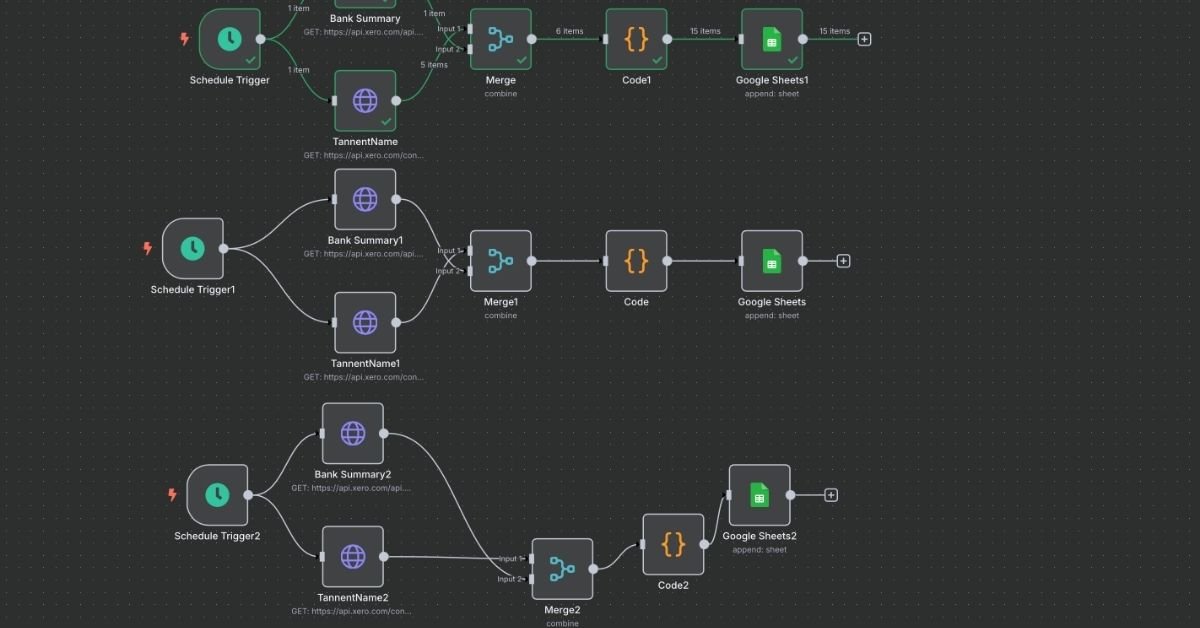Manually updating financial reports every week can drain your time and lead to costly errors — especially for small businesses juggling multiple tasks. In this case study, I’ll show you how I helped a business fully automate its reporting workflow using n8n, Xero, and Google Sheets — saving hours each week while keeping their Power BI dashboards up-to-date and error-free.

Client Background
A small business owner reached out with a familiar pain point: weekly financial reporting was eating up too much of their time. Every week, they manually exported data from Xero, cleaned it in Google Sheets, and refreshed Power BI dashboards to track key financial metrics.
Not only was this process time-consuming—often taking up 2 to 3 hours—it also left room for human error. Copy-paste mistakes, forgotten steps, or inconsistent formatting could lead to inaccurate reports. They wanted automation, but didn’t want to invest in costly third-party integrations or premium tools.
That’s where I stepped in with a simple, cost-effective solution: automate the entire reporting workflow using n8n, Google Sheets, and a bit of Python.
The Problem
Here’s what their manual process looked like every week:
Export reports from Xero manually
Copy data into structured Google Sheets
Clean and format the data
Refresh Power BI dashboards using that data
While this got the job done, it took several hours and required constant oversight. They needed a system that would just “work in the background” — without recurring manual steps or expensive platforms.
The Automation Strategy
To solve this, I built an end-to-end workflow using n8n, a powerful open-source automation tool. The goal was to automatically pull, clean, and push financial data into a format compatible with Power BI — every single day.
Step 1: Connecting to Xero via n8n
I set up a secure OAuth2 connection in n8n to access the client’s Xero data through its official API. This allowed me to pull in important financial information automatically, including:
Invoices
Bank summaries
Profit and Loss statements
No more logging in or downloading files — the data now flowed directly into the workflow.
Step 2: Processing the Data with Python
Once the raw data was fetched, I used a custom Python function inside n8n to clean and prepare it. This included tasks like:
Flattening complex JSON structures
Converting values into readable formats
Standardizing currency and date formats
Removing null or redundant fields
This step ensured the data was Power BI-ready and free of inconsistencies.
Step 3: Sending the Data to Google Sheets
After processing, the cleaned data was pushed directly into Google Sheets. The client was already using these sheets as a data source for their Power BI dashboards — so no major change was needed.
The sheets were now automatically updated every day, with the freshest financial data.
Step 4: Schedule & Automation
The best part? This entire flow runs daily, without anyone lifting a finger. The client gets updated dashboards every morning, without spending hours on manual reporting.
The Results
⏱️ Time Saved: 2–3 hours per week recovered
⚡ Real-Time Data: Google Sheets now always has the latest info
💰 Cost Savings: No need for expensive reporting tools or middleware
📊 Accurate Dashboards: Power BI updates itself using live data
🧘 Peace of Mind: No more errors, missed exports, or forgotten updates
Tools Used
n8n: For building the automation and scheduling the flow
Xero API: To securely fetch financial data
Python (within n8n): For advanced data cleaning and transformation
Google Sheets: A lightweight and familiar data layer for the client
Power BI: For creating interactive financial dashboards
Final Thoughts
This project proves that you don’t need expensive software to automate business reporting. With a smart combination of open-source tools and custom logic, even small businesses can enjoy fully automated, real-time insights — without touching a single spreadsheet.
If you’re a small business owner using Xero and Power BI, and tired of doing things manually every week — let’s talk. I can help you set up an automation that works silently in the background, so you can focus on running your business, not running reports.

